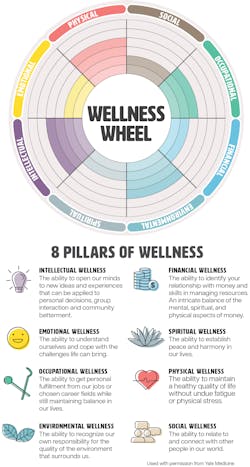Wellness for dental hygiene professionals: It starts with you
We’ve all heard a flight attendant announce, “Secure your own mask before helping others.” To help others, you must first help yourself. As dental hygienists, we should be practicing self-care as a way to help ourselves. This starts with a focus on wellness, which is defined as “the active pursuit of activities, choices, and lifestyles that lead to a state of holistic health.”1 How do you prioritize wellness?
Wellness is critical to the successful future of health care. Dental providers, students, and faculty are all experiencing high levels of stress and burnout. The profession of dentistry saw a shift through the pandemic, which took a toll on the mental and physical health of providers around the globe.
Health-care professionals are struggling with their own self-care; many acknowledge the importance of personal and professional wellness but have difficulty achieving it. The lack of time or motivation to exercise, make healthy food and drink choices, maintain healthy relationships, work on personal development, employ stress reduction techniques, and get enough sleep are all factors in stress and burnout.
Burnout in the workplace is so common that the World Health Organization (WHO) classified it as an occupational phenomenon in the 11th Revision of the International Classification of Diseases (ICD-11).2 Burnout results from workplace stress that has not been successfully managed and is characterized by lack of energy, exhaustion, or lack of enjoyment and fulfillment from work.
This impacts provider satisfaction, patient experience, workforce shortages, care delivery models, and professional licensing. There’s a critical need for health-care providers to learn how to prevent or minimize the harm from burnout and pandemic-related fatigue and successfully navigate ethical, legal, and moral obligations.
A holistic approach to self-care for dental professionals
Emphasizing wellness leads to a more fulfilling and longer career. Taking a holistic approach can make the biggest impact on overall health and wellness. One model for holistic wellness is the Wellness Wheel, which was originally developed by Dr. Bill Hettler, cofounder of the National Wellness Institute, in 1976. The original wheel had six pillars of wellness. The wheel has evolved, and most experts now agree on eight pillars of wellness. The Wellness Wheel in Figure 1 was developed by Yale School of Medicine.3
Emotional wellness
“Our ability to acknowledge and share feelings of anger, fear, sadness, or stress, and hope, love, joy, and happiness in a productive manner.”3 Two components of emotional wellness are mindfulness and emotional intelligence. Mindfulness is about being present. As health-care providers we get very busy taking care of others. Do you ever stop and take a “mindful minute” to truly be present in the moment? Emotional intelligence means managing your own emotions while understanding the emotions of others. This includes self-awareness, self-regulation, motivation, empathy, and social skills. 4 Journaling is a good method to grow your emotional intelligence.
Physical wellness
“The ability to recognize that our behaviors have a significant impact on our wellness, and adopting healthy habits (routine check-ups, balanced diets, exercise) while avoiding destructive ones.”3 Specific goals can include:
- Becoming comfortable with your appearance
- Adopting healthy eating and drinking habits
- Understanding how stress, additives, alcohol, and caffeine affect your body
- Getting tested for sleep apnea. (80%–90% of people with mild to moderate obstructive sleep apnea are undiagnosed.)5
- Moving your body every day: walking every day for 21 minutes can reduce your risk of heart disease by 30%.6
- Investing in ergonomics to reduce pain and risk of musculoskeletal disorders. This includes CE courses, coaching, and ergonomic products such as ErgoPrism loupes, CordEze, AeroPro cordless handpiece, and a saddle stool.
Spiritual wellness
This represents your personal beliefs and values and involves having meaning, purpose, and a sense of balance and peace.7 Spiritual wellness is an individual journey. Assess your own spiritual wellness by asking:
- What gives my life meaning?
- Where do I find hope and comfort?
- Do I know my core values and do those align with my decisions and actions?
Yoga is one way to improve physical and spiritual wellness.8 The spiritual aspect of yoga includes finding calm, peace, hope, clarity, happiness, and a sense of meaning.9 Meditation also improves spiritual health and reduces burnout by controlling breathing and completely relaxing the body and mind.10
Occupational wellness
“Our desire to contribute in our careers, to make a positive impact on the organizations we work in, and to give back to society as a whole.”3 Passion is the energy we feel and what we are interested in. Purpose is all about why we want to do something. Have you discovered both? Tips for fostering a healthy career are to reflect on your needs; don’t settle; be a mentor and find a mentor; live your best life by using your strengths; invest in yourself by networking and attending CE; set career goals; and get involved in professional organizations.
Intellectual wellness
“Our desire to learn new concepts, be open to new ideas and improve our skills, and seek challenges in pursuit of lifelong learning.”3 Ways to improve intellectual wellness include trying something new, reading, being social, staying curious, getting creative, resting, practicing self-reflection, playing brain games, and working on mindset.
Developing a growth mindset is a fantastic way to expand intellectual wellness. A growth mindset is the belief that failure is an opportunity to learn, and growth and development come from hard work. Those with a growth mindset value risk-taking and the power of “yet.”11
Financial wellness
“Our ability to understand our financial situation and taking care of it in such a way that we are prepared for financial changes.”3 Currently, 73% of Americans ranked finanches as the number one stress in life.12 Financial stress can take a toll on relationships, work satisfaction, and quality of life. Some suggestions to improve financial wellness include negotiating for a raise; creating a budget; understanding taxes and legal implications of contractor versus employee; planning retirement and savings; paying off debt; and implementing will and estate planning.
Social wellness
“Our ability to establish and maintain positive relationships with family, friends, and coworkers.”3 Healthy social habits can build a support system that positively impacts mental and physical health.13 Evaluate your social wellness. Are you asking for help when you need it? Are you surrounding yourself with a positive community? Are you able to communicate clearly when dealing with conflict?
Strategies to improve social wellness include making connections; taking care of yourself while caring for others; building healthy relationships; and spending time with people who make you feel loved. In addition, working on conflict resolution skills can help build and maintain healthy relationships.
Environmental wellness
“The opportunity to make a positive impact on our environment, be it in our workplace, our communities, or our planet.”3 Eco-friendly suggestions include oral health products such as Woobamboo toothbrushes; reusables and biodegradable options to reduce plastic waste; and improving your health by helping making the environment safer.
Put the wellness wheel into action
Self-care is vital for health-care providers; it enables practitioners to handle the stress and demands associated with caring for others. Balance means having all eight pillars in the wellness wheel equally aligned. Our wellness is dependent on the integrity of every aspect of our being.14
AUTHOR'S NOTE: Are you ready to take steps to improve your wellness to become more alert, vibrant, empathetic, and sustainable? The Abundant Life Health and Wellness Hub is here to help! Visit healthandwellnesshub.com for links to self-assessment quizzes, videos, blogs, articles on the wellness wheel, and the opportunity to connect to a support system.
Editor's note: This article appeared in the October 2023 print edition of RDH magazine. Dental hygienists in North America are eligible for a complimentary print subscription. Sign up here.
References
- What is wellness? Global Wellness Institute. Accessed June 14, 2023. https://globalwellnessinstitute.org/what-is-wellness.
- Burnout an “occupational phenomenon”: International Classification of Diseases. World Health Organization. May 28, 2019. Accessed June 14, 2023. https://www.who.int/news/item/28-05-2019-burn-out-an-occupational-phenomenon-international-classification-of-diseases
- Resident Wellness Program. Yale Medicine. Accessed June 7, 2023. https://medicine.yale.edu/urology/education/residents/wellness/
- How to improve your emotional intelligence. Professional Development Harvard. August 26, 2019. Accessed June 14, 2023. https://professional.dce.harvard.edu/blog/how-to-improve-your-emotional-intelligence/
- Obstructive sleep apnea. American Academy of Sleep Medicine. Accessed June 14, 2023. https://aasm.org/resources/factsheets/sleepapnea.pdf
- Walking for health. Harvard Health. Accessed June 14, 2023. https://www.health.harvard.edu/exercise-and-fitness/walking-for-health
- Spiritual wellness. Healthy SD. Accessed June 14, 2023. https://healthysd.gov/spiritual-wellness/
- Lane CK. An addition to the ergonomic toolbox. Dimens Dent Hyg. November 19, 2019. https://dimensionsofdentalhygiene.com/article/an-addition-to-the-ergonomic-toolbox/
- Csala B, Springinsfeld CM, Köteles F. The relationship between yoga and spirituality: a systematic review of empirical research. Front Psychol. 2021;12(8). doi.org/10.3389/fpsyg.2021.695939
- Saxena R, Ladkat S. Meditation: a powerful stress buster in dental care professionals. J Dent Allied Sci. 2012;1(2):45. doi.org/10.4103/2277-4696.159132
- Dweck C. Mindset: The New Psychology of Success. Random House; 2016.
- White A. 73% of Americans rank their finances as the No. 1 stress in life, according to new Capital One CreditWise survey. CNBC. https://www.cnbc.com/select/73-percent-of-americans-rank-finances-as-the-number-one-stress-in-life/
- Social Wellness Toolkit. National Institutes of Health. June 21, 2017. Accessed June 14, 2023. https://www.nih.gov/health-information/social-wellness-toolkit?fbclid=IwAR128NvOZ5QU_hq-tv40pi5SlttOl4d8tUp0zpyUc5szZ0T5hdsoXFPwcfQ
- Stiles R. Eight dimensions of wellness: If wellness was a house. Wellness Tool. October 7, 2021. Accessed June 14, 2023. https://wellnesstool.com/eight-dimensions-if-wellness-was-a-house/
About the Author

Sarah Jackson, MS, RDH
Sarah Jackson, MS, RDH, is a professor of dental hygiene and program director for the Bachelor of Science in Health Science and Dental Hygiene degree completion programs at Eastern Washington University. She is a health and wellness advocate, yoga ambassador, and pilates instructor. Sarah leads wellness interventions with her community, colleagues, and students, and is an international speaker and published author. She cofounded Abundant Life Wellness Hub to help others live an abundant, healthy life.

